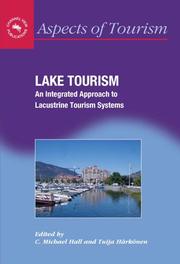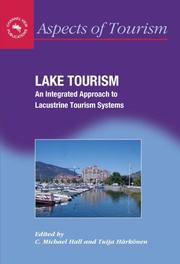| Listing 1 - 7 of 7 |
Sort by
|
Book
ISBN: 8839903666 Year: 1991 Publisher: Brescia Queriniana
Abstract | Keywords | Export | Availability | Bookmark
 Loading...
Loading...Choose an application
- Reference Manager
- EndNote
- RefWorks (Direct export to RefWorks)
Book
ISBN: 9781003230335 9781032136547 Year: 2025 Publisher: London Routledge
Abstract | Keywords | Export | Availability | Bookmark
 Loading...
Loading...Choose an application
- Reference Manager
- EndNote
- RefWorks (Direct export to RefWorks)
The Routledge Handbook of Tourism and Indigenous Peoples presents an up-to-date, critical and comprehensive overview of established and emerging themes around Indigeneity and connections between Indigenous peoples and tourism development. Offering socio-cultural perspectives and multidisciplinary insights from leading Indigenous and non-Indigenous scholars and tourism practitioners, the book explores contemporary issues, challenges and trends. Organised into six sections, the handbook explores Indigenous community involvement in tourism, Indigenous entrepreneurship and innovation, Indigenous tourism policies and politics, and the complexities of colonialism and decolonisation issues. This text focuses on the active role that Indigenous peoples have in the industry and uses international case studies and experiences to explore the global context of Indigenous tourism. This handbook fills a notable gap by offering a critical and detailed understanding of the role of Indigenous practitioners and societies in tourism and how they interact within the tourism nexus. It will be of interest to scholars, students, tourism practitioners and policymakers working in tourism, development studies, anthropology, human geography and sociology.
Culture and tourism --- Tourism --- Social aspects
Book
ISBN: 1911396412 1911396404 9781911396413 Year: 2017 Publisher: Oxford : Goodfellow Publishers Limited,
Abstract | Keywords | Export | Availability | Bookmark
 Loading...
Loading...Choose an application
- Reference Manager
- EndNote
- RefWorks (Direct export to RefWorks)
Australia and New Zealand are arguably two of the world's leading Indigenous tourism destinations. This volume presents a collection of unique case studies focusing on issues pertaining to Indigenous tourism planning and development.Issues covered include: • Strategies for sustainable development;• Diversifying economies through Indigenous tourism;• Preparing for tourism and developing capacity;• Successful Indigenous tourism entrepreneurshipThe research papers in this volume introduce some of the most interesting entrepreneurial Indigenous tourism ventures and associated research in the world, providing inspiration and information to readers (i.e., students, researchers and industry) around the world.With contributions from experts in the field Indigenous Tourism: cases from Australia and New Zealand is the first edited volume to specifically focus on the Indigenous tourism sector in Australia and New Zealand.This collection represents the first volume to specifically highlight the culture, traditions, and knowledges of the First Peoples of Australia and New Zealand and provides important reading for researchers, students and practitioners around the globe as awareness of, and interest in the diversity of Indigenous cultures, traditions, histories and knowledges continues to grow.
Culture and tourism. --- Heritage tourism. --- Indigenous peoples. --- Tourism --- Cultural property --- Cultural property, Protection of --- Cultural resources management --- Cultural policy --- Historic preservation --- Aboriginal peoples --- Aborigines --- Adivasis --- Indigenous populations --- Native peoples --- Native races --- Ethnology --- Cultural tourism --- Ethnotourism --- Tourism and culture --- Social aspects. --- Protection. --- Protection --- Government policy --- Australia. --- New Zealand. --- Aotearoa --- N.Z. (New Zealand) --- Nea Zēlandia --- Neu-Seeland --- Neuseeland --- Nieu-Seeland --- Niu-hsi-lan --- Nouvelle-Zélande --- Nov-Zelando --- Nova Zelanda --- Nova Zelandii︠a︡ --- Novai︠a︡ Zelandii︠a︡ --- Novai︠a︡ Zelandyi︠a︡ --- Novi Zeland --- Nový Zéland --- Novzelando --- Nowa Zelandia --- Nu Ziland --- Nueva Zelanda --- Nueva Zelandia --- Nuova Zelanda --- Nya Zeeland --- Nýja-Sjáland --- Nýsæland --- Nyū Jīrando --- Nyu Ziland --- Nyūjīrando --- NZ --- Seland Newydd --- Uus-Meremaa --- Zeelanda Berria --- Νέα Ζηλανδία --- Нова Зеландия --- Новая Зеландыя --- ניו זילנד --- ニュージーランド --- Ahitereiria --- Aostralia --- Ástralía --- ʻAukekulelia --- Austraalia --- Austraalia Ühendus --- Australian Government --- Australie --- Australien --- Australiese Gemenebes --- Aŭstralii︠a︡ --- Australija --- Austrālijas Savienība --- Australijos Sandrauga --- Aŭstralio --- Australské společenství --- Ausztrál Államszövetség --- Ausztrália --- Avstralii︠a︡ --- Avstraliĭski sŭi︠u︡z --- Avstraliĭskiĭ Soi︠u︡z --- Avstraliĭskii︠a︡t sŭi︠u︡z --- Avstralija --- Awstralia --- Awstralja --- Awstralya --- Aystralia --- Commonwealth of Australia --- Cymanwlad Awstralia --- Državna zaednica Avstralija --- Government of Australia --- Ḳehiliyat Osṭralyah --- Koinopoliteia tēs Aystralias --- Komanwel Australia --- Komonveltot na Avstralija --- Komonwelt sa Awstralya --- Komunaĵo de Aŭstralio --- Komunejo de Aŭstralio --- Kūmunwālth al-Usturālī --- Mancomunidad de Australia --- Mancomunitat d'Austràlia --- Negara Persemakmuran Australia --- New Holland --- Nova Hollandia --- Osṭralyah --- Ōsutoraria --- Persemakmuran Australia --- Samveldið Ástralía --- Usṭralyah --- Usturāliyā --- Whakaminenga o Ahitereiria --- Κοινοπολιτεία της Αυστραλίας --- Αυστραλία --- Аўстралія --- Австралия --- Австралија --- Австралийски съюз --- Австралийският съюз --- Австралийский Союз --- Комонвелтот на Австралија --- Државна заедница Австралија --- אוסטרליה --- קהיליית אוסטרליה --- أستراليا --- كومنولث الأسترالي --- オーストラリア
Book
Year: 1965 Publisher: New York (N.Y.) : Harper and Row,
Abstract | Keywords | Export | Availability | Bookmark
 Loading...
Loading...Choose an application
- Reference Manager
- EndNote
- RefWorks (Direct export to RefWorks)
Book
Year: 1965 Publisher: New York (N.Y.): Harper and Row
Abstract | Keywords | Export | Availability | Bookmark
 Loading...
Loading...Choose an application
- Reference Manager
- EndNote
- RefWorks (Direct export to RefWorks)


ISBN: 1845413776 1280507756 9786610507757 1845410424 9781845410421 1845410416 1845410408 9781845410407 9781845410414 6610507759 Year: 2006 Publisher: Bristol, UK Blue Ridge Summit, PA
Abstract | Keywords | Export | Availability | Bookmark
 Loading...
Loading...Choose an application
- Reference Manager
- EndNote
- RefWorks (Direct export to RefWorks)
Lakes are an essential element of some of the world's most popular tourism destinations. However, increased pressure from visitors and the tourism industry as well as from other, sometimes competing, land and water uses has made the sustainable development of lakes increasingly problematic. This book represents the first attempt to bring together some of the key elements of lake tourism within a single volume in order to present the urgent need for an integrated approach to lacustrine tourism systems management.The book presents comprehensive overviews of lake tourism including branding and marketing, visitor management and planning, historical and cultural dimensions, and environmental quality. The volume is international in scope with cases from Europe, North America and Oceania. The book concludes by noting that tourism needs to be established as a complimentary land and water use at a time when lakes and their watersheds are facing challenges in the form of climate and environmental change, increasing numbers of visitors as well as an overall increase in competing demands for water.
Lakes. --- climate change. --- destination management. --- environmental change. --- lacustrine tourism. --- lake tourism. --- sustainable management. --- sustainable tourism. --- tourism attractions. --- tourism management. --- visitor management. --- water tourism.


ISBN: 9781845410421 9781845410414 Year: 2006 Publisher: Bristol, UK;; Blue Ridge Summit, PA Channel View Publications
Abstract | Keywords | Export | Availability | Bookmark
 Loading...
Loading...Choose an application
- Reference Manager
- EndNote
- RefWorks (Direct export to RefWorks)
| Listing 1 - 7 of 7 |
Sort by
|

 Search
Search Feedback
Feedback About UniCat
About UniCat  Help
Help News
News